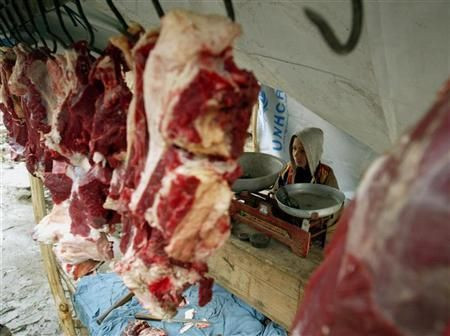Derek Nance Brings The Paleo Diet To New Heights By Eating Only Raw Meat For The Past 5 Years

Derek Nance was forced to make drastic changes to his daily eating habits after he developed what doctors considered a food allergy. Even after cutting wheat and dairy out of his diet, Nance was still experiencing nausea and vomiting when he ate. He decided to eliminate all food groups from his diet, except for raw meat. Five years later, the Lexington, Ky., native could not be more satisfied.
When going vegan failed to alleviate his mystery food illness, Nance started to research different diets and explore his options. That’s when he came across the paleo diet and decided to give eating only raw meat a shot.
“I had a couple of goats in my yard that I was using for milk, and, you know, I was tired of milking them,” Nance told Vice in an exclusive interview. “So I slaughtered them. I ate both of those goats, all raw, and just switched over like that.”
Today, Nance uses animal fat to brush his teeth as well as animal blood and organs for a healthy dose of vitamin C. He says that, other than mild diarrhea while his digestive system adapted to the switch, there were no more sick feelings from eating after the first week.
“About three weeks in I noticed this real strong blood-like taste in the back of my throat and then all of a sudden I started getting strong cravings for it. The idea of cooked meat no longer appeals. It just tastes burned. And herbs and spices too, I used to season the meat, but seasonings no longer appeal either.”
Close to six years later, Nance has eaten nothing but raw meat and says that this is the healthiest he has ever been. Among his favorite slices of meat is lamb because it’s easy to acquire and less of a hassle to deal with compared to cow's meat.
“It’s just easy to go out to farms, barter over a decent price, slaughter it, and throw it in the truck,” Nance told Vice. “It’s a lot harder to deal with beef because it’s a lot bigger.”
The paleolithic or caveman diet is based off what a human being in the prehistoric era presumably ate, including meat, vegetables, nuts, and fruits. It also requires the elimination of processed breads, sugars, legumes, and dairy products like milk, yogurt, and cheese. Although this food fad has gained popularity, some nutritionists are not sold on such a restricted diet.
"It has eliminated several food groups like dairy and grains, which provide essential nutrients, such as calcium, vitamin D, magnesium and phosphorus in dairy and B vitamins, fiber and antioxidants in grains," Joy Dubost, of the Academy of Nutrition and Dietetics, told the Huffington Post. "Legumes also provide a great protein source with little fat and lower in calories while providing essential nutrients and fiber."
Published by Medicaldaily.com



























